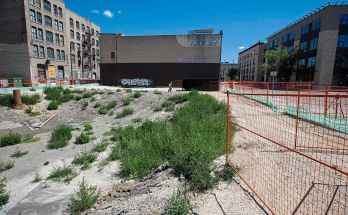Ending influx of asylum-seekers to Canada easier said than done: expert
Read this article for free:
or
Already have an account? Log in here »
To continue reading, please subscribe:
Monthly Digital Subscription
$19 $0 for the first 4 weeks*
- Enjoy unlimited reading on winnipegfreepress.com
- Read the E-Edition, our digital replica newspaper
- Access News Break, our award-winning app
- Play interactive puzzles
*No charge for four weeks then billed as $19 plus GST every four weeks. Offer only available to new and qualified returning subscribers. Cancel any time.
Read unlimited articles for free today:
or
Already have an account? Log in here »
Hey there, time traveller!
This article was published 16/07/2018 (2367 days ago), so information in it may no longer be current.
Telling the federal government to halt the influx of asylum-seekers entering Canada from the United States is easier said than done, an immigration expert and one of the critics pushing for the move say.
“Borders — no matter how many fences, dogs, border patrols, regulations and rules — will not stop people from moving,” said Lori Wilkinson, editor-in-chief of the Journal of International Migration and Integration.
“Migration is a human phenomenon that started centuries ago — and will continue today,” said Wilkinson, a sociology professor at the University of Manitoba. “Visas and passports are only 100 years old or so… a very modern invention. That still doesn’t keep people out.”

The measures some countries have taken to deter migrants and those seeking asylum have made recent headlines.
The American government separated close to 3,000 children from their asylum-seeking parents to send a message to families considering travelling to the U.S. to ask for refuge.
Australia has relied on a widely criticized strategy of holding asylum-seekers in prison-like detention centres on remote islands. At those centres, thousands of asylum-seekers have been detained for years, and some have committed suicide.
Up until this past week, the government of Algeria has been taking migrants to the scorching Sahara desert and leaving them near the Niger border. More than 13,000 people — including women and children — have been dropped off in such a manner since May 2017, according to the International Organization for Migration.
The expulsions were reported by The Associated Press after migrants posted videos of themselves fanning out across the open desert, stumbling through heat that reaches 50 C in summer, while Algerian gendarmes with guns ensured they did not turn back. Of the more than two dozen migrants interviewed in neighbouring Niger, nearly all reported seeing deaths during the forced march, which sometimes lasted days.
The European Union is looking at building processing centres, probably in Africa, where migrants could be screened for asylum — and from where only legitimate refugees might move on to Europe.
The tide of migrants won’t stop until countries that mistreat their people are held accountable and the world’s resources are more fairly distributed, said Wilkinson.
“Germany has realized this fact,” said the researcher who spent time in Germany after it opened its doors to Syrian refugees in 2016. “So have most governments — they just won’t admit it.”
In Canada, the number of asylum-seekers intercepted by RCMP dropped for the sixth consecutive month, according to data released this week by Immigration, Refugees and Citizenship Canada.
In Manitoba, 31 refugee claimants arrived in June, compared to 35 in May — totalling 219 since the beginning of the year. In Quebec, 1,179 arrived in June — the lowest level this year — bringing the total for that province to 10,261 for 2018.
That’s still a significant number of people showing up in cities and provinces needing help the federal government isn’t adequately providing, said Conservative immigration critic Michelle Rempel.
Earlier this year, she called on the government to table a plan to stop the influx of asylum-seekers entering Canada. On Monday, the House of Commons immigration committee (Rempel is a member) asked for federal and provincial ministers to testify on the surge of asylum-seekers and on how cities and province are left to cope.

“It’s very frustrating to get information,” said Rempel, who is seeking to find out many refugee claims are valid and how long is it taking claimants to find employment and permanent housing.
“If we have data, then we can adequately assess what they’ve put together and meet the needs of the situation,” she said.
The dire lack of shelter in Toronto, where asylum-seekers are housed in college dorms, with students returning to classes in less than two months, shows the “urgent and immediate” need for Parliament to address the issue, she said.
Rempel said her party supports a “strong and robust asylum system,” and called on the federal government to challenge the U.S. on its part in the Canada-United States Safe Third Country Agreement. If Canada believes the U.S. is truly a safe place for refugees to call home, it should explore ways to have the U.S. take back the asylum-seekers who crossed into Canada, the Tories argue.
The federal government hasn’t broached the subject with the U.S, as far as Rempel knows.
The standard response is: “The Americans are never going to take people back,” she said.
“How do you know that?” Rempel said. “Why are we assuming the starting position is ‘no’?”
carol.sanders@freepress.mb.ca

Carol Sanders
Legislature reporter
After 20 years of reporting on the growing diversity of people calling Manitoba home, Carol moved to the legislature bureau in early 2020.
Our newsroom depends on a growing audience of readers to power our journalism. If you are not a paid reader, please consider becoming a subscriber.
Our newsroom depends on its audience of readers to power our journalism. Thank you for your support.










